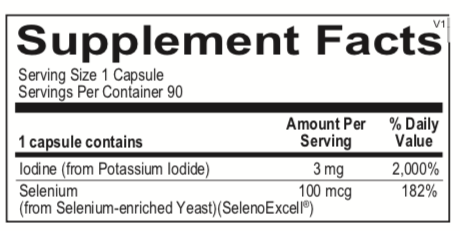
Seleno Iodine
CLINICAL APPLICATIONS
- Supports Thyroid Health
- Supports Healthy Synthesis of Thyroid Hormones
- Helps Maintain Healthy Breast Tissue
Seleno-Iodide provides a synergistic blend of iodine, along with its trace mineral partner selenium, to help maintain iodine levels and reduce oxidative stress for optimal thyroid and breast health. Seleno-Iodide provides 3 mg of iodine combined with 100 mcg of selenium sourced from SelenoExcell®, a highly bioavailable, organically bound selenium.
Supplement Facts
Serving Size: 1 Capsules
Servings Per Container: 90
Iodine†
Iodine is an essential trace mineral found in various forms in nature and is necessary for human growth and development. Dietary sources of iodine include seafood, seaweeds including wakame and nori, navy beans, potatoes, and iodized salt.
Approximately 15 to 20 mg of iodine is concentrated in the thyroid gland in a healthy human body.1 Iodine is necessary for the synthesis of thyroid hormones, as it is one of the most important components of the hormones thyroxine (T4) and tri-iodothyronine (T3). T3 is the most active thyroid hormone and binds to receptors in the liver and brain to regulate gene expression.
In addition to supporting thyroid hormone production, research shows iodine acts as an antioxidant, supporting a healthy thyroid gland and protecting a variety of tissues, including mammary tissue, the eyes and gastrointestinal lining.2 In other tissues, such as the mammary glands, the protective role of iodine is connected to its antioxidant function.3,4 Iodide can act as an electron donor in the presence of hydrogen peroxide and peroxidase, thereby decreasing damage by free oxygen radicals (Figure 1). In research studies, serum concentrations of iodine as low as 15 micromolar have demonstrated comparable antioxidant activity to vitamin C.5

Directions
1 capsule per day or as recommended by your health care professional.
Does Not Contain
Gluten, artificial colors and flavors.
Cautions
If you are pregnant or nursing, consult your physician before taking this product.
Selenium†
Selenium is a trace mineral required to produce several important compounds, including enzymes involved in antioxidant mechanisms and thyroid hormone metabolism. Selenium intake depends largely on soil conditions in the region where food is grown or raised. Food sources of selenium include Brazil nuts, eggs, peas, poultry and meats. SelenoExcell® is a bioavailable, organic selenium supplement that is closest to forms found in nature.
Under-functioning of the thyroid has been found to be common in regions where selenium deficiency rates are high.6 Selenium is crucial in supporting thyroid health, as it is a required cofactor for three key enzymes involved in the production of thyroid hormones, the iodothyronine deiodinases. Iodothyronine deiodinases catalyze the release of iodine from T4 to T3, allowing for increased production of the more metabolically active thyroid hormone T3 (Figure 1). Low plasma selenium concentrations have been found to be associated with impaired conversion of T4 to T3.7
The thyroid gland is a highly metabolically active tissue in which oxidative processes are indispensable for thyroid hormone synthesis. This is namely because that the thyroid naturally produces large amounts of hydrogen peroxide (H2O2). Hydrogen peroxide is a necessary substrate for thyroid peroxidase (TPO), an enzyme expressed mainly in the thyroid, which plays a major role in thyroid hormone synthesis (Figure 1).
Under healthy physiological conditions, a balance between the generation and detoxification of free radicals is maintained.
A powerful antioxidant enzyme system is activated to ensure the thyroid is protected from ongoing free radical production. Glutathione is one of the key antioxidants used to neutralize free radicals in the thyroid. Glutathione, requires selenium to activate the enzyme glutathione peroxidase (GPX). Selenium-containing GPX in the thyroid cell plays a pivotal role in maintaining normal thyroid functioning by protecting the gland from oxidative stress by removing excess H2O2 from the tissues.8,9 Subsequently, supplementation with selenium has been shown to modify inflammatory and immune responses in patients with immune challenges and decrease TPO antibodies.6, 10,11
- Farhana A, Shaiq GA. Iodine, iodine metabolism and iodine deficiency disorders revisited. Indian J Endocrinol Metab. 2010 Jan-Mar; 14(1):13-17.
- Dunn JT. What’s happening to our iodine? Clin Endocrinol Metab 1998;83: 3398-3400.
- Venturi S. Is there a role for iodine in breast diseases? Breast J 2001; 10:379-382.
- Cocchi M, Venturi S. Iodide, antioxidant function and omega-6 and omega-3 fatty acids: a new hypothesis of biochemical cooperation? Prog Nutr 2000;2:15-19.
- Smyth PP. Role of iodine in antioxidant defense in thyroid and breast disease. Biofactors 2003;19:121-130.
- Pizzorno JE, Murray MT. The Clinician’s Handbook of Natural Medicine. 2nd Ed. 2008.
- Duffield AJ, Thomson CD, Hill KE, Williams S. An estimation of selenium requirements for New Zealanders. Am J Clin Nutr 1999; 70:896-903.
- Imai Y, Kataoka K, Nishikimi M. A possible function of thiols, including glutathione, as cofactors in the conversion of thyroxine to 3,3’5-tiiodothyronine in rat liver microsomes. Endocrinol Jpn 1980 Apr; 27(2):201-7.
- Moustafa SA. Effect of glutathione (GSH) depletion on the serum levels of triiodothyronine (T3), thyroxine (T4), and T3/T4 ratio in allyl alcohol-treated male rats and possible protection with zinc. Int J Toxicol 201 Jan-Feb;20(1):15-20.
- Beckett BJ, Arthur JR. Selenium and endocrine systems. J Endocrinol 2005; 184; 455-465.
- Duntas LH. The role of selenium in thyroid autoimmunity and cancer. Thyroid 2006; 16: 455-465.
- Eskin BA, Grotowski CE, Connolly CP, et al. Different tissue responses for iodine and iodide in rat thyroid and mammary glands. Biol Trace Elem Res 1995:49:9-19.
- KesslerJH.Theeffectofsupraphysiologiclevelsofiodine on patients with cyclic mastalgia. Breast J. 2004 Jul-Aug;10(4):328-36.


